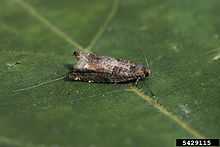Epinotia tetraquetrana
From Wikipedia, the free encyclopedia
| Epinotia tetraquetrana | |
|---|---|
 | |
| Scientific classification | |
| Kingdom: | Animalia |
| Phylum: | Arthropoda |
| Class: | Insecta |
| Order: | Lepidoptera |
| Family: | Tortricidae |
| Genus: | Epinotia |
| Species: | E. tetraquetrana |
| Binomial name | |
| Epinotia tetraquetrana (Haworth, [1811])[1] | |
| Synonyms | |
| |
The Square-barred Bell (Epinotia tetraquetrana) is a moth of the Tortricidae family. It is found from most of Europe east to the Near East and the eastern part of Palearctic ecozone.[2]
The wingspan is 12–16 mm. Adults are on wing from April to May.[3]
The young larvae bore into the stem of Betula and Alnus species. Later, they feed within a folded leaf.
Gallery
-

Damage
-

Damage
References
This article is issued from Wikipedia. The text is available under the Creative Commons Attribution/Share Alike; additional terms may apply for the media files.